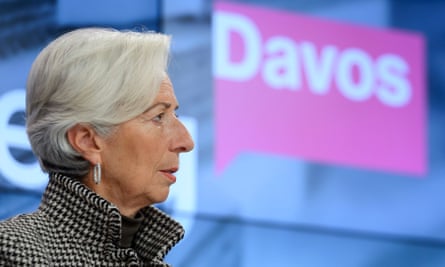The gulf between men and women at work – in both pay and status – is likely to widen unless action is taken to tackle inequality in high-growth sectors such as technology, say researchers at this week’s World Economic Forum summit in Davos.
A new WEF report on the future of jobs finds the dominance of men in industries such as information and biotechnology, coupled with the enduring failure of women to rise to the top even in the health and education sectors, is helping to reverse gender equality after years of improvements.
Quick GuideWhat is Davos 2020?
Show
Davos is a Swiss ski resort now more famous for hosting the annual
four-day conference for the World Economic Forum. For participants it is
a festival of networking. Getting an invitation is a sign you have made
it – and the elaborate system of badges reveals your place in the Davos hierarchy. The meeting is sponsored by a huge number of international banks and corporations.
For critics, “Davos man” is shorthand for the globe-trotting elite, disconnected from their home countries after spending too much time in the club-class lounge. Others just wonder if it is all a big waste of time.
The 2020 meeting is being advertised as focusing on seven themes: Fairer economies, better business, healthy futures, future of work, tech for good, beyond geopolitics and how to save the planet. Young climate activists and school strikers from around the world will be present at the event to put pressure on world leaders over that last theme.
The report estimates that 57% of the jobs set to be displaced by technology between now and 2026 belong to women. According to Saadia Zahidi, the WEF’s head of education, gender and work, this underlines that global efforts to reduce gender inequality in business are stalling.
“We’re really looking at a worsening of inequality, particularly in IT but across all sectors,” Zahidi said. “We are losing valuable opportunity to reduce gender inequality.”
The warning comes at a historic moment in the 47-year history of Davos: for the first time, the annual gathering of the world’s political and financial leaders in the Swiss mountain resort will have all-female co-chairs, in an attempt to increase awareness of longstanding gender and other inequalities in business and wider society.
The seven women chosen to lead the meeting come from all sectors of society: from the head of the International Monetary Fund, Christine Lagarde, to Chetna Sinha, an Indian social entrepreneur focused on micro-finance for female entrepreneurs.

Sharan Burrow, the general secretary of the International Trade Union Confederation and another of the seven co-chairs, said the fact that no men have been appointed to any of the meeting’s strategic roles this year “sends a strong signal that all is not right with the world”.
Burrow, an Australian union leader who described herself in her acceptance speech in 2010 as a “warrior for women”, said recent events had made it even more important to speak up for gender equality in the workplace and society at large. “We saw a wave of misogyny unleashed last year and it’s been allowed to escalate by government and corporations,” she told the Guardian.
The US president Donald Trump, who is expected to attend Davos this week, was “partly responsible for unleashing” this wave, she added.
Despite introducing a quota in 2011 designed to increase the number of female delegates attending, men continue to dominate Davos. Just 21% of some 3,000 delegates are women.
The WEF’s annual gender gap report at the end of last year calculated that the gulf between male and female opportunity had widened for first time since it started gathering data in 2006. “The global economic model has failed working people and failed women more than most,” Burrow said. “In the world of work, using any set of indicators, progress for women has stagnated. This has been driven by corporate greed and profit, more than anything.”
Chetna Sinha, the founder and chair of the Mann Deshi Foundation, believes that the all-female panel will bring gender inequality into “the heart of the corporate/business world, and that’s a really useful thing”.
She is particularly keen to ensure that “voices of poor women” are heard, adding that the panel emphasises the diversity of experience at Davos, with non-governmental and grassroots organisations joining the political and business leaders. “At Davos, I see myself representing the fractured world,” she said.

Zahidi, whose team’s report on the future of work is published on Monday, identified two potential causes for the stalled progression of women in business. First, the fact there are fewer women working in high-growth areas such as IT, biotech and infrastructure, leading to a “smaller pipeline” even as larger numbers of women are going into higher education to study the relevant subjects.
Second, Zahidi said that even in high-growth sectors which typically employ lots of women – such as education, health and the care sector – the “leadership positions are still dominated by men”.
Despite widespread warnings about increasing automation – robots (real and virtual) doing the work of human beings – hitting so-called blue collar jobs in manufacturing, less has been said about “pink collar” jobs in customer service and administration typically held by women. Zahidi said corporations needed to consider organisational change at all levels of the workplace. “It needs a holistic approach from companies when thinking about gender equality – not just board-level positions. Diversity leads to creativity, which is even more necessary in a world undergoing an industrial revolution,” she said.
Each year, studies such as one from accountancy firm Grant Thornton in 2015, Women in business: the value of diversity, point out that companies perform better when they have at least one woman on the board. Yet change has been glacial and, after years of some improvement, is beginning to stall.
Mervyn Davies, the former senior banker and minister whose 2011 report set a 25% target for women on FTSE-100 boards, is not attending Davos this year. He applauds efforts to increase participation at the meeting, and believes any future progress will be led by “upwardly focused activism” rather than the old model, exemplified by Davos, of “downward discussion”.
“I think the mood of society is really changing very speedily. We are at a tipping point where the up-and-coming generation is going to say ‘we’re not going to tolerate this,’ ” Lord Davies said, adding, “We’ve got to get women back in all workplaces.”
Two years after his final report on the issue, Davies talked about the entrenched opinions he faced even as a successful chairman of a leading bank, Standard Chartered. “I faced a huge amount of hostility from men. I was a member of their club and because I was an insider they accused me of being an agent provocateur from the inside.”
His final report called for one third of all FTSE-350 boards to be held by women.
Despite the signs of stagnation, both Davies and Zahidi, who last year authored a book about the impact of more women joining the workforce in the Muslim world, are optimistic, partly because of the next generation. “The fact there has been a very public conversation around sexual harassment, around the #MeToo and the Time’sUp movements – all of this reflects the fact that a much larger number of people care about the influence of power,” said Zahidi. “There is now positive momentum and we need to make sure material change is achieved.”
Zahidi points out that among the younger people attending Davos, the so-called global leaders and global shapers, 54% are women.
Arriving in Davos, Burrow said: “We have the power in our hands to really change. The question is, do we have the courage?”
World-changing women? The seven Davos co-chairs

Christine Lagarde
Managing director of the IMF
The French lawyer and former cabinet minister has been the head of the International Monetary Fund since 2011, when she replaced the scandal-hit Dominique Strauss-Kahn. Re-elected for a second five-year term in 2016, she is regularly ranked as one of the most powerful women in the world by Forbesmagazine.

Ginni Rometty
Chief executive of IBM
Having started as a systems engineer in 1981, Rometty worked in sales, marketing and strategy before becoming the first woman to lead the head IBM in 2011. One of the best paid executives in the US – she earned $33m (nearly £24m) last year – she has faced mounting criticism for taking pay bonuses despite huge employee layoffs.

Sharan Burrow
General secretary of International Trade Union Confederation
The Australian was the first woman to become general secretary of the Brussels-based ITUC, the world’s largest trade union federation with 180 million workers in 162 countries and territories. This self-styled “warrior for women” has worked on several campaigns for workers’ rights in the growing digital economy.

Chetna Sinha
Founder/chair of Mann Deshi Mahila Sahakari Bank
The Mumbai-born social activist set up a bank that lends tiny sums to women in rural India after meeting a woman unable to save because other institutions thought her aim – to buy a tarpaulin to shelter her family during the monsoon – was too small. Singha’s bank, the first run for and by rural women to get a co-operative banking licence, has reached hundreds of thousands of women.

Erna Solberg
Prime minister of Norway
Elected Norway’s second female prime minister in 2013 after serving as leader of the Conservative party since May 2004. As minister for local government, a tough stance on the country’s asylum policy earned her the nickname “Jern-Erna” (Iron Erna). Subsequently involved in the decision to reject a request for asylum by the Israeli nuclear whistleblower Mordechai Vanunu. Solberg was re-elected last year.

Fabiola Gianotti
Director general of Cern
In 2016, the Italian particle physicist became the first woman to run Cern – the pan-European nuclear research organisation best known for its large hadron collider. Always ranks high on lists of global thinkers and most influential scientists – of either gender.

Isabelle Kocher
Chief executive of Engie
The only female CEO in the CAC 40, the benchmark French stock market, Kocher has led a radical transformation of the energy group formerly known as GDF Suez since her appointment in 2016. Having decided Engie should “take its responsibility” over climate change, she has sold 20% of its assets, notably in coal power. She also set internal targets for at least a quarter of Engie executives, and 35% of “high-potential staff” to be women.
- If you have experiences relating to this article that you’d like to share, please email us at inequality.project@theguardian.com











Comments (…)
Sign in or create your Guardian account to join the discussion